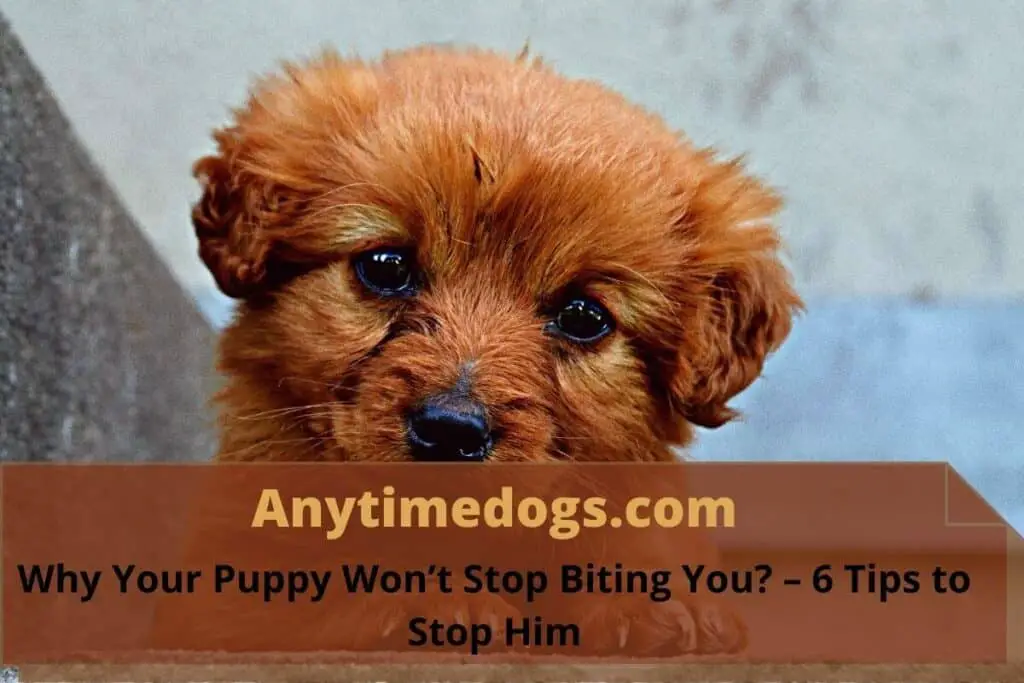Puppies are the cutest creatures, aren’t they? These small furballs are so full of energy that you will never see them sitting idle.
They are always wandering, playing, cuddling, or chewing things like slippers or rugs and some puppies even pick to nibble on you.
No matter you have just become a new pup parent or you already have experienced a pup’s parenthood. You must know that training a pup is no less than a challenge. However, it is the best time to train your dog.
The most asked question by pup parents is “My puppy won’t stop biting me I’ve tried everything”. And the same question brings you here!
Calm down! Biting is very common among puppies and it is considered to be a sign of being playful and exploring.
But sometimes it becomes very irritating when you have just come back from work and resting, or sitting with friends, or enjoying your favorite TV show.
Make a read to the end of this post, and we will tell you 6 magical tricks to stop your puppy from biting you.
My Puppy Won’t Stop Biting Me I’ve Tried Everything – What can I Do!
As I can guess, you are tired of stopping your puppy from biting you. If you are thinking of quitting, or you think you cannot take your puppy out of this biting phase. Then relax, that’s not a hopeless situation.
You can control this behavior of your puppy if you stay consistent with the behavioral training. Let’s cover some ways to stop your puppy from biting you.
You can also read about why do dogs sit on you?
1) Yelp on Him When He Bites You:
When your puppy bites you, do not yip with an “ouch”. Wake up the puppy inside you and yelp on him loud.

Many people discourage shouting at pups. But here, screeching is the easiest way to get your puppy’s attention. And surprisingly, we have seen them stop biting.
Keep calm, I know you may have tried this method or it won’t work. I wish you to try this persistently. It might not be effective alone but pairing it up with any upcoming method can control your mischievous pup.
Though new pet parents aren’t advised to use this method excessively. Like children, puppies also get habitual to behaviors and it may not work for a long time.
2) Redirect His Focus:
Combining the yelping method with redirecting your pup’s attention to something else will enforce the change of this behavior to a decent one.
Take a toy; shake it or jiggle it to catch your puppy’s attention and redirecting it to the toy. Make your puppy excited about the toys and motivate him to play with the toys, not with your hands or feet.
If your puppy is teething, offer him a cold teething toy or his favorite frozen chewies that could help relieve the pain he is feeling pacify his chewing movements.
You can also treat train your puppy if he doesn’t get excited about toys. Offer him some tasty snacks along with toys in the playtime. This can help your puppy to let go of your delicious digits.
3) Avoid Response:
Sometimes, all a puppy wants is your attention. He may want to hear your yelp or voice command. This is the time when you need to avoid your response.
Give him a cold shoulder and start with basic commands like “sit” or “stop”. Avoid giving him attention later. Turn away from your puppy, cross your arms, or just walk away.
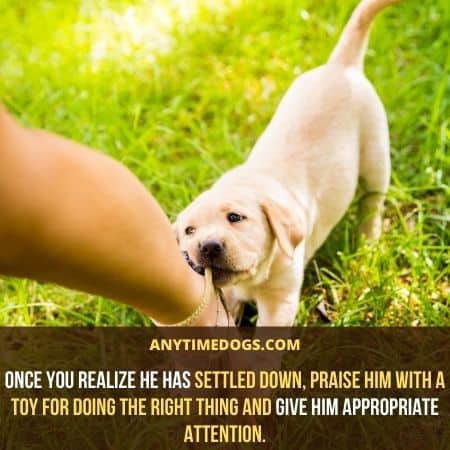
Once you realize he has settled down, praise him with a toy for doing the right thing and give him appropriate attention.
This technique can not only help you with biting but also jumping, barking, or any attention-seeking behavior.
4) Bone Or Chew Toys:
You can use bone or chew toys to address this biting behavior. The need is to keep your puppy mentally stimulated and busy learning a new thing.
Your puppy should have an activity that keeps his attention. Eating chews or chew toys will keep him busy and away from getting bored and biting you.
5) Behavioral Training:
Behavior training is considered best to train your puppies at an early age. Behavior training can do wonders if done correctly.
You can behavior train your dog to break his biting habit. Remember behavior training and obedience training aren’t the same.
Obedience training is about training your dog to understand your basic commands and to act accordingly. While behavior training is used to break a particularly bad habit of your dog that has become constant and setting a boundary.
There are two basic behavior training methods you can try if your puppy won’t stop biting you:
A) Time Out:
If you know, time-out training is also used for human kids to break their habits. What happens in a time-out is you just isolate the pup for some time and make them realize that certain behavior is unacceptable.
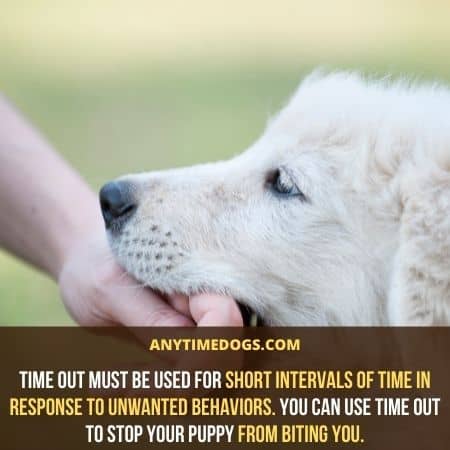
Time out must be used for short intervals of time in response to unwanted behaviors. You can use time out to stop your puppy from biting you.
Choose a time-out area and isolate him whenever he bites you. Remember time out in case of puppies should not exceed more than 3 mins. Mostly in this duration puppies calm down and cut off their social interaction for some time.
Do not use time out excessively. Anything can stop working if you make a punishment a permanent habit. Be kind and stay consistent.
B) Crate Training:
Crate training is similar to time out. It can be used in the same manner. Let your puppy accept the crate as a safe space. Crate training can be for a long time.
The crate is more than just training. It can be used as a safe puppy sitter. You can let your pup crate overnight or whenever you aren’t at home. Make your puppy feel safe like at home in a crate.
As your puppy is biting and you want him to stop, you can use the crate for time-out purposes. Do not show anger to your puppy eventually he will calm down.
You can offer him a chew toy to play with and when you see he has calmed down let him come back out.
6) Muzzle Training:
Muzzle training can be fruitful if you have tried all methods above. Hold on, I am not asking you to be cruel with your pup or do this most of the time.
Muzzle training should be taken as training. You must know about the proper procedure to follow this.
It is very important to keep in mind that you are not supposed to punish your pup every time he misbehaves. This can make him aggressive and make the situation worse.
After research, if you opt for muzzle training make sure the muzzle is comfortable and easy to use. Use it as a training tool. Don’t get harsh on him and let him accept this training.
Muzzle training is a great way to make your puppy understand that his teeth are sharp and not meant for biting you or anyone. Use treats to encourage the behavior.
Muzzles come with free training guides to help you use them safely. Muzzles are padded with neoprene layer so that it doesn’t hurt your dog.
My Puppy Won’t Stop Biting Me I’ve Tried Everything – 5 Reasons to Know!
Biting behavior is usually associated with playfulness. It is very important to know that why your puppy is developing this annoying habit.
When you know the cause, you can treat it better. Below are the 5 most common reasons why your puppy is biting you:
1) Instinct:
As we use our hands to touch and feel, puppies use their mouths. The first thing they use right after birth is their mouth so, it’s an instinct. If your puppy bites, his intentions might not be chewing, destroying, or harm.
Nobody wants their pup to be lazy, so let him explore in the right way. Give him chew toys and practice behavior training.
2) Teething:
Teething pups get frustrated by the swollen gums. Chewing is the best way to relieve the pain. To avoid biting on your fingers, give him frozen chew toys to get the ease they want.
Teething is an important development stage for a pup so try to pay full attention to him if he is being fussy.
3) Boredom:
Dogs should stay mentally and physically active. A bored puppy can be destructive because it has nothing to do with his energy. So, make your puppy play on his own and stop being dependent on you.
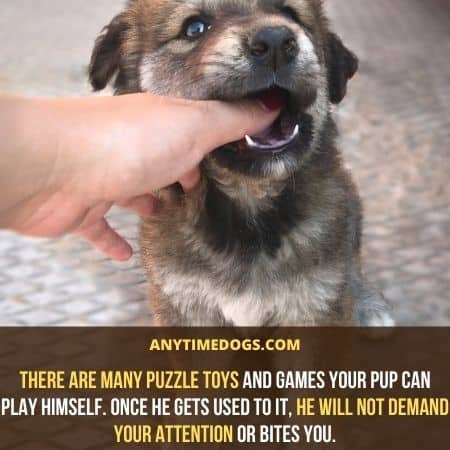
There are many puzzle toys and games your pup can play himself. Once he gets used to it, he will not demand your attention or bites you.
Puppies are just cute joyful creatures and they don’t know that their biting can hurt someone badly. Negative behaviors become difficult to train when dogs get older so stay consistent with the right upbringing.
4) Anxiety:
Anxiety can take many forms. A puppy is likely to show aggressive behaviors if he gets fearful or anxious being alone or away from you.
If your puppy bites you when you leave for work or come back, he is probably trying to tell you that he doesn’t like being left alone.
You can make some changes to his routine to calm him. take him for professional training to get rid of his aggressiveness.
5) Socializing:
As a responsible guardian, you need to introduce your pup to new environments, pets, and people.
Socialization can make a puppy less anxious and brave. Once your puppy is vaccinated try to make him experience new situations and people during his formative stage.
Remember to keep an eye on him when he is around pets so that you know the interaction is having a positive impact on him. make sure that he is safe, happy, and enjoying.
Again, consistency is the key in all kinds of training. Also, stay patient with your puppy’s behavior.
Top Mistake to Avoid with Your New Puppy
We have discussed a lot of ways to train your puppy. But most pet parents make a huge mistake at an early age of their puppy and that is giving their hands and feet to him for playtime.
This mistake can significantly take part in your dog’s biting habit. We all do this. Who can resist cuddling with those little adorable creatures?
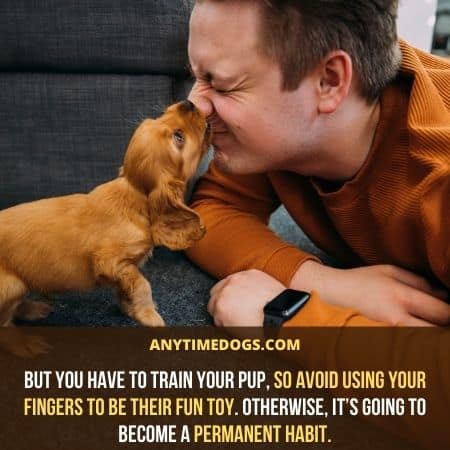
But you have to train your pup, so avoid using your fingers to be their fun toy. Otherwise, it’s going to become a permanent habit.
My Puppy Won’t Stop Biting Me – Conclusion:
It can be very challenging to train a playful puppy that biting is unacceptable. All dogs have different personalities and some of them can be quite stubborn.
Be patient and put in consistent efforts to improve the situation. Remember practice makes perfect. You can try multiple methods to train your dog.
You’re well on your way to a calm and collected puppy.

